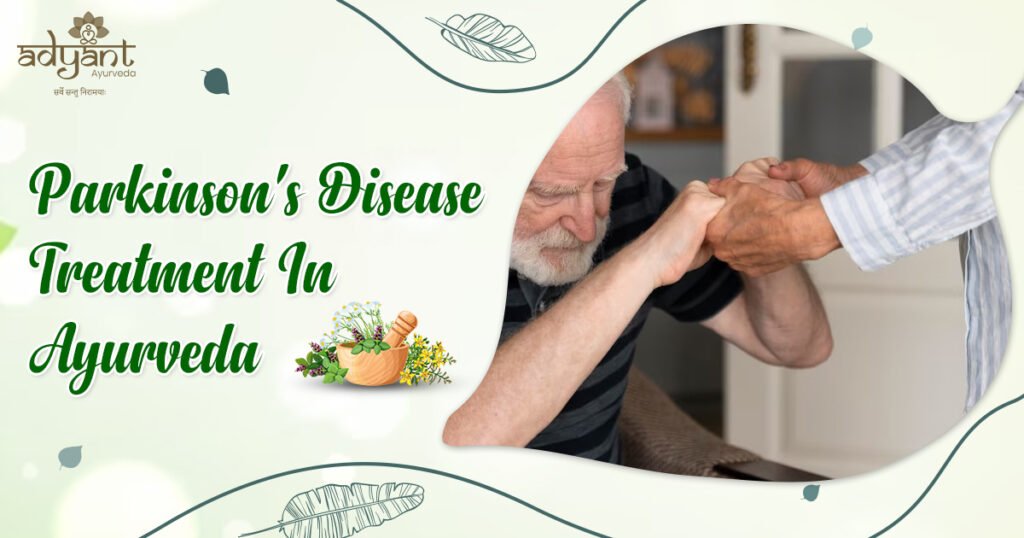Table of Contents
ToggleParkinson’s Disease Treatment in Ayurveda: Parkinson’s disease is a chronic neurological disorder affecting millions worldwide. It is characterized by tremors, bradykinesia (slow movement), muscle rigidity, and postural instability. While conventional treatments like medication and physical therapy can help manage symptoms, there is a growing interest in alternative therapies like Ayurveda, which offers a holistic approach to Parkinson’s disease management.
In this blog, we’ll explore how Adyant Ayurveda, the leading Ayurveda hospital, benefits individuals with Parkinson’s Disease Treatment in Ayurveda. We will discuss Ayurvedic herbal medicines, dietary and lifestyle changes, various Ayurveda treatments, safety considerations, and the possibility of integrating Ayurveda with conventional medical care.
Ayurvedic Treatment for Parkinson’s Disease
Key Aspects of Ayurvedic Treatment for Parkinson’s
Ayurveda views Parkinson’s disease as a manifestation of Vata imbalance, primarily affecting the nervous system. The treatment focuses on restoring balance through herbs, therapies, and dietary modifications.
Ayurvedic Herbs for Parkinson’s Disease
These powerful herbs help manage symptoms and slow the progression of the disease:
- Kapikacchu (Mucuna Pruriens) – Contains L-Dopa, a precursor to dopamine, improving motor function.
- Ashwagandha – Reduces stress, strengthens the nervous system, and has anti-inflammatory properties.
- Brahmi – Enhances cognitive function and supports memory.
- Guggul – Has anti-inflammatory effects and promotes nerve health.
- Turmeric (Curcumin) – Acts as an antioxidant, protecting brain cells from degeneration.
- Shankhpushpi – Supports brain function, relieves stress, and improves cognition.
These herbs are known for their neuroprotective and antioxidant properties, which can help manage the progression of Parkinson’s disease and alleviate symptoms.
Ayurvedic Therapies for Parkinson’s Disease
External Therapies (Bahya Chikitsa)
These therapies provide relief by balancing Vata dosha and improving nervous system function.
- Abhyanga (Ayurvedic Oil Massage) –
- Uses medicated herbal oils to nourish the nervous system and reduce tremors.
- Strengthens muscles, joints, and soft tissues.
- Swedana (Sudation Therapy) –
- Induces sweating to expel toxins and improve circulation.
- Various types include:
- Sarvanga Bashpa Sweda (Full-body steam therapy)
- Nadi Sweda (Herbal steam therapy)
- Patra Pinda Sweda (Herbal poultice massage)
- Churna Pinda Sweda (Powder massage therapy)
- Shashtika Shali Pinda Sweda (Navarakizhi, rice bolus massage)
- Murdhni Taila (Head Oil Therapies) –
- Addresses the root cause of Vata imbalance in the brain.
- Includes:
- Shiro Dhara – Continuous oil stream on the forehead.
- Shiro Pichu – Oil-soaked cotton application on the head.
- Shiro Lepa – Herbal paste application on the head.
- Shiro Vasti – Oil retention therapy on the scalp.
Internal Therapies (Abhyantara Chikitsa)
Panchakarma Therapy is the primary detoxification treatment for Parkinson’s disease:
- Virechana (Therapeutic Purgation) – Removes toxins and balances Vata.
- Vasti (Medicated Enema) – One of the most effective treatments for Vata disorders.
- Nasya (Nasal Therapy) – Strengthens the nervous system by administering medicated oils through the nostrils.
Diet and Lifestyle Changes for Parkinson’s Disease
Ayurveda emphasizes a balanced diet and lifestyle for Parkinson’s management.
Dietary Guidelines:
- Eat warm, easily digestible foods – Favor soups, khichdi, and well-cooked vegetables.
- Use Vata-pacifying spices – Turmeric, ginger, black pepper, and cumin.
- Avoid processed foods – Reduce sugar, refined carbohydrates, and excessive caffeine.
- Consume ghee and healthy fats – Nourish the nervous system and lubricate joints.
Lifestyle Modifications:
- Daily Oil Massage (Self-Abhyanga) – Helps improve circulation and reduces muscle stiffness.
- Stay Active – Engage in mild yoga, stretching, and walking.
- Follow a Consistent Sleep Routine – Sleep early and wake up refreshed.
Role of Stress Management in Parkinson’s Disease
Stress can worsen symptoms; therefore, effective stress management is crucial.
Recommended Techniques:
- Mindfulness Meditation – Enhances mental clarity and emotional stability.
- Deep Breathing Exercises (Diaphragmatic Breathing) – Reduces anxiety and improves oxygenation.
- Yoga for Parkinson’s – Strengthens muscles, enhances flexibility, and calms the mind.
- Progressive Muscle Relaxation (PMR) – Relieves tension and improves coordination.
- Music and Art Therapy – Encourages relaxation and emotional expression.
- Counseling and Support Groups – Helps cope with the psychological impact of the disease.
Benefits of Stress Management:
- Improved symptom control and motor function.
- Reduced dependency on medications.
- Better sleep and increased energy levels.
- Enhanced emotional well-being and quality of life.
Safety Considerations and Side Effects
Ayurvedic treatments are generally safe when administered by trained practitioners. However, individual responses vary, and some mild side effects may occur:
- Digestive discomfort (if herbs are not suited to the individual)
- Skin reactions (due to certain herbal oils)
- Herbal interactions with medications (always consult a qualified Ayurveda doctor)
Why Choose Adyant Ayurveda for Parkinson’s Disease Treatment?
At Adyant Ayurveda, we provide:
- Personalized Ayurvedic Treatment Plans
- Expert Ayurveda Doctors with Years of Experience
- Authentic Panchakarma Therapy for Nervous System Disorders
- A Holistic Approach Integrating Diet, Lifestyle, and Herbal Remedies
If you’re considering Ayurveda for Parkinson’s disease management, consult our experienced practitioners for a customized healing plan.
Conclusion
Ayurveda offers a holistic and individualized approach to managing Parkinson’s disease. By using Ayurvedic herbs, therapies, dietary adjustments, and stress management techniques, individuals can experience better symptom control and improved quality of life. Integrating Ayurveda with conventional treatments can enhance overall well-being and provide long-term benefits.
Book Your Consultation Today!
Visit Adyant Ayurveda, Bangalore’s leading Ayurveda hospital, for expert guidance on Parkinson’s Disease Treatment.
FAQs Related to Parkinson’s Disease Treatment in Ayurveda
Q1: Which Ayurvedic herbs help manage Parkinson’s disease?
A1: Herbs like Kapikacchu, Ashwagandha, Brahmi, Guggul, Turmeric, and Shankhpushpi have neuroprotective properties and can slow disease progression.
Q2: Can Ayurveda completely cure Parkinson’s disease?
A2: While Ayurveda cannot cure Parkinson’s, it can significantly slow progression, manage symptoms, and improve quality of life.
Q3: How does Panchakarma therapy help in Parkinson’s disease?
A3: Panchakarma therapies like Virechana, Vasti, and Nasya help detoxify and rejuvenate the nervous system.









